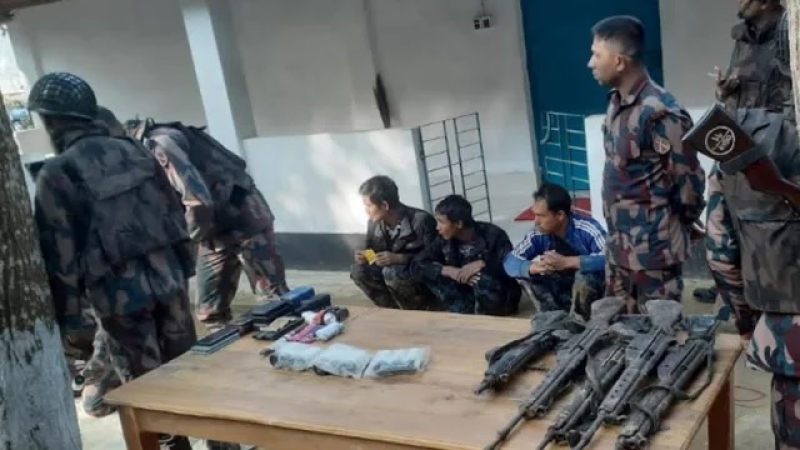- Tarique Rahman to Return Home With Daughter on Dec 25 |
- ILO praises Bangladesh’s labour reforms, new milestones |
- Depositors stranded as Sammilito Islami Bank is in liquidity crisis |
- BNP faces uphill task to reach seat-sharing deal with allies |
- Bangladesh rejects India’s advice; vows free, fair polls |
Dhaka’s Humanitarian Corridor Dilemma: Aid vs Nat’l Interest

Myanmar Border Guard Police take refuge with BGB at Coxs Bazaar. (File photo)
As Myanmar’s Rakhine State continues to suffer from armed conflict between the Myanmar Army and the Arakan Army, the United Nations (UN) has proposed a humanitarian corridor to deliver essential aid. While Bangladesh’s Foreign Ministry has conditionally agreed to the proposal, opposition leaders argue that this move could lead to diplomatic misunderstandings, further complicating the Rohingya refugee crisis.
With over 1.3 million Rohingya refugees already in Bangladesh, the country faces a tough choice—whether to support humanitarian efforts or safeguard its national security and foreign policy interests.
The worsening humanitarian crisis in Rakhine has left thousands of civilians stranded without food, medical assistance, or shelter. Advocates of the humanitarian corridor argue that Bangladesh, a long-standing champion of human rights and refugee protection, has a moral duty to ensure aid reaches those in need.
Furthermore, some believe that stabilizing Rakhine through relief efforts might pave the way for the safe repatriation of Rohingya refugees, reducing the long-term burden on Bangladesh.
Despite the humanitarian need, political leaders in Bangladesh have voiced strong concerns about potential security threats and geopolitical consequences. Bangladesh has no diplomatic ties with either faction controlling Rakhine—the Myanmar Army or the Arakan Army—making direct engagement risky.
Key concerns include:
• It involves national security risks as humanitarian involvement could unintentionally drag Bangladesh into Myanmar’s internal conflict.
• Increased political tensions are likely because Myanmar’s military government might see Bangladesh’s participation as interference, delaying repatriation talks.
• Regional destabilization cannot be ruled out because if improperly handled, the corridor could lead to long-term diplomatic complications, further affecting Bangladesh’s stance on Rohingya repatriation.
Bangladesh must find a strategic way forward that protects its national interests while ensuring humanitarian support is provided responsibly. To achieve this, the country should:
• Engage regional allies by working alongside India, China, and ASEAN. This could provide a stable framework for aid distribution.
• Any aid corridor agreement must include clear guarantees from Myanmar regarding safe passage for relief workers and repatriation measures.
• Instead of handling the crisis alone, Bangladesh could urge global institutions to adopt a collective multilateral response, preventing undue pressure on its resources.
Bangladesh must carefully weigh the humanitarian benefits against the potential geopolitical risks of endorsing the UN’s corridor proposal. While humanitarian assistance is essential, decisions must be made in a way that ensures Bangladesh’s sovereignty, security, and long-term stability.
With tensions rising, thoughtful diplomacy and firm negotiations will be crucial in shaping Bangladesh’s response to this complex international crisis.

